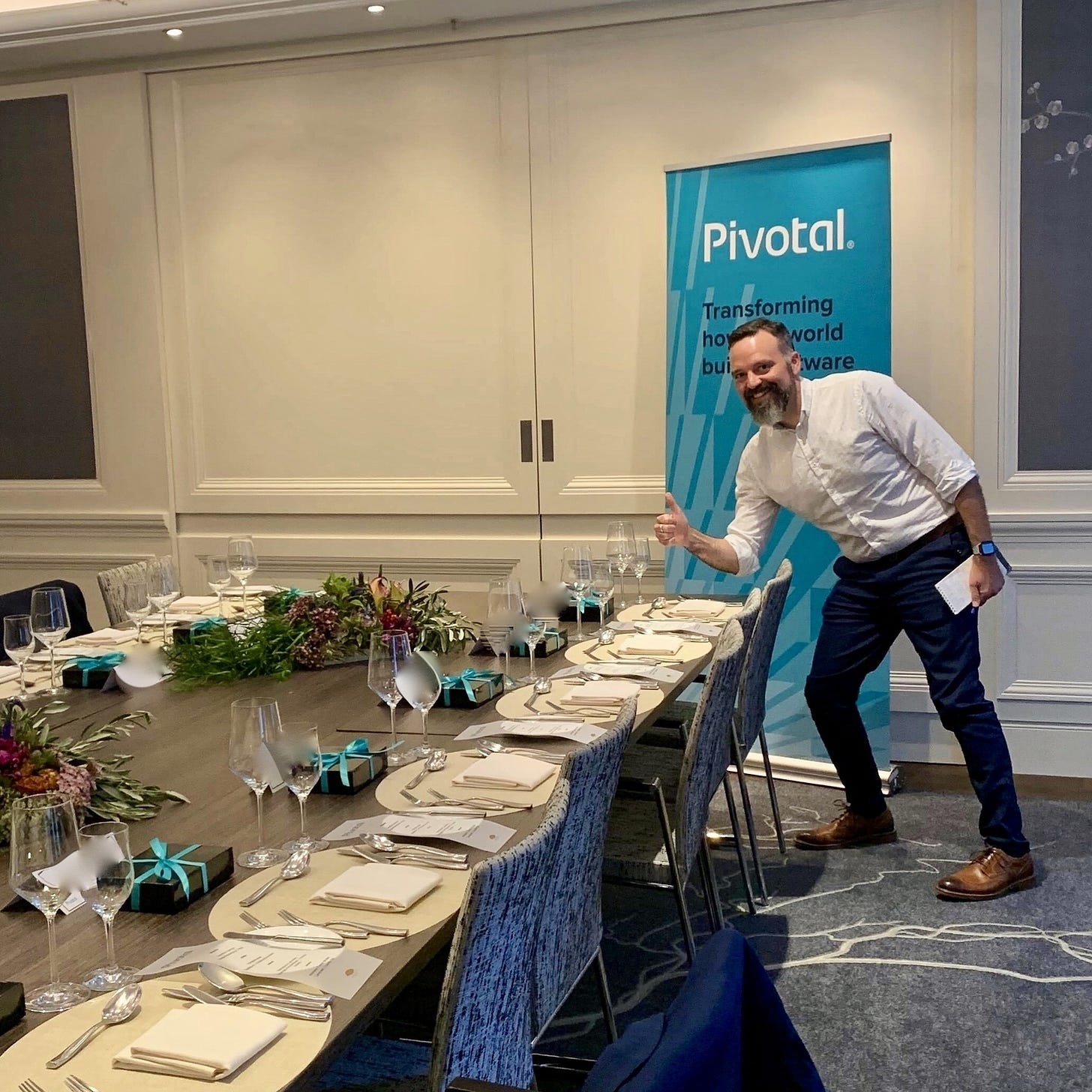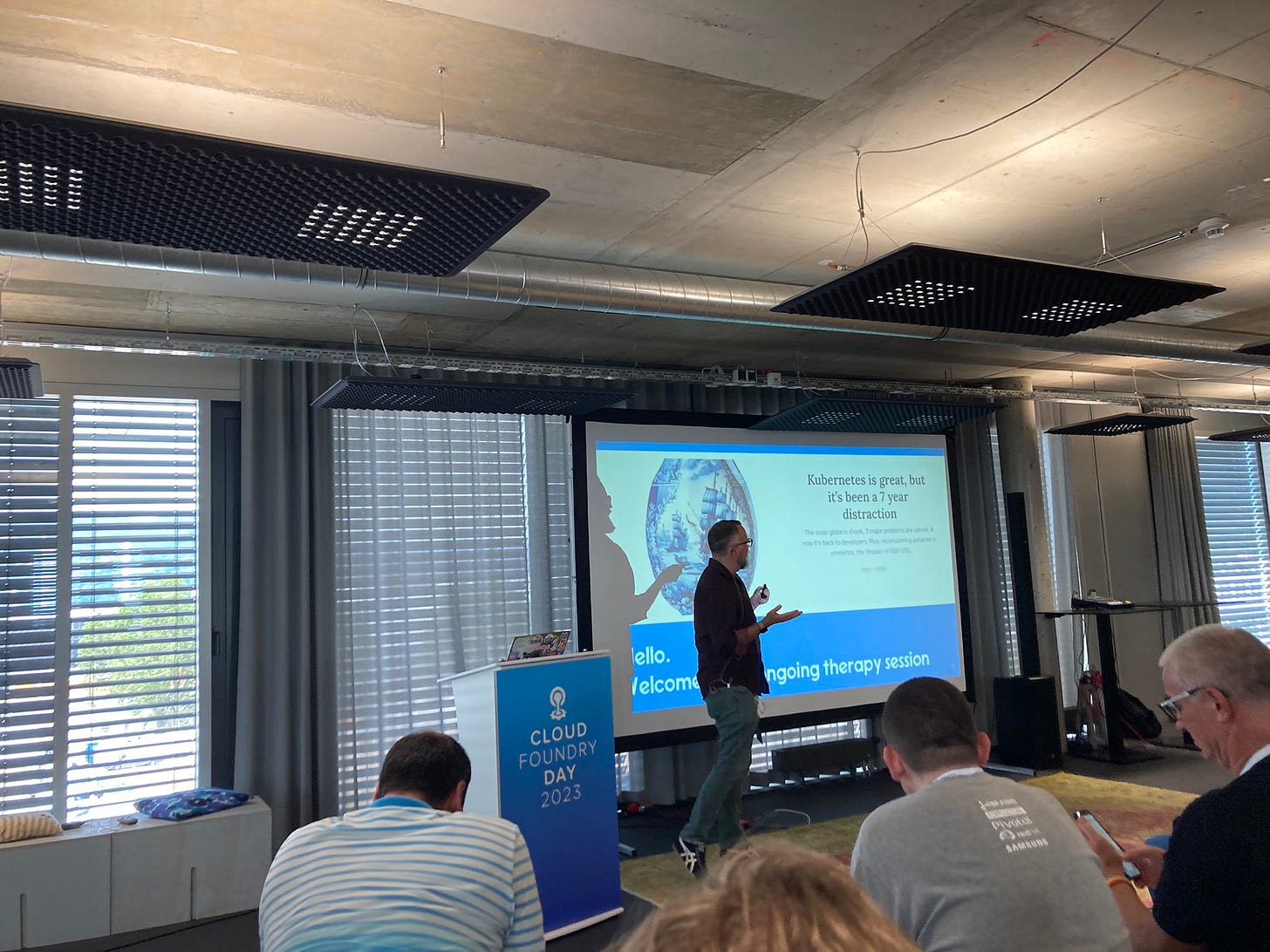Coté
Steve McQueen by, John Dominis - That guy made being cool look easy.
Island Series: 6 Pack - These look like more amazing notebooks from a boutique shop.
Adopt Platform Engineering to Scale Application Security Practices - “Gartner Survey Data Reveals a Missed Opportunity - Platform teams focus on improving developer experience, developer productivity, software quality and delivery speed. According to Gartner’s 2022 Software Engineering Leaders Role Survey, only 25% of respondents cited “reduced security risks’’ as one of the top three goals for platform engineering and only 6% ranked it as the topmost goal.” // Here we are, about to finally have a moment that’s just focused on making appdev better, and of course security has to come in and try to grab all the attention. This already happened with Kubernetes in the past few years. And: maybe it was a good idea to keep all this stuff separated in its own team so that each team can focus.
ChatGPT web traffic falls 10%, analytics show - Indeed. I think I’ve found the limitations. The main one is the limit in the text you can feed it. If I could build up my own training data, that’d be something! The Link Reader plugin solves the summarizing web pages problem that I was having. What needs to happen now is just to get it integrated into enterprise software, and all the data ownership privacy stuff that goes with that. That’ll take at least six month, if not a year, to get through the security, legal, etc. people. So, check back in in 2025?
Scratch Pad: Fireworks, Bootlegs, Spock - “I remain convinced that most categories of online services are akin either to hair salons, to grocery stores, or to movie theaters.”
Also, the Spock picture.
Porter’s Five Forces and the social web - There’s something interesting to do here in applying Porter to contemporary tech.
Less Upcoming Than Usual
A bonus Sunday episode!
Waking up this morning, my first thought was how different my job is now with less travel. Like many tech companies, we have smaller budgets for travel. The means I can only take three or so trips a quarter unless I get someone else to pay for it, or for customer/sales visits.
I dropped down a level in airline status due to decreased travel over the past year (and the lack of KLM maintaining your status to make up for COVID-times for several years). Yes, yes, “must be nice” and all that. I do a lot more at the desk work: writing, webinars and online talks, plus just general meetings/consulting about stuff.
That mix should have more videos, but as I mentioned awhile ago, after three years I don’t think my topic area works for videos. What do “executives” actually read and act on?
The explosion of social media is a huge blow to the developer advocate and tech marketing world. Surveys asking where developers got their info used to show that Twitter was up there.
Maybe I’m supposed to write more books? Arrange more online chats and panels in, like, LinkedIn? I was invited to an online CTO, like, salon last week. It was late on Friday night for me (living in Amsterdam), so I didn’t attend. That format is interesting…?
Is less travel better for my work, for my career, for my well-being? It must be better for, like, the environment.
Over the years, I’ve seen thought leader types…not so much burn out, as reach an end of their willingness to travel for work, or, maybe at the effectiveness of travel. You sort of run out of things to say at some point; you fill your audience’s idea-bucket. And once you start feeling like you’re repeating yourself, it’s hard to think all the effort you put in it worth it.
I’m not really sure what these grounded thought-leaders shift to doing instead. It used to be that you could just shoot out some clever tweets weekly to keep your thought leadering up, but that’s all dead now.
When I try to work on more content, there’s two problems I encounter.
As mentioned above, I can’t get the kind of eyeballs I would at a conference, just presenting to a room full of people. I spoke at a conference in Utrecht awhile back, and the number of people who followed my CTA and downloaded my book was huge compared to, like, the Internet as an audience on any given day. What do people in my field even read? I have no idea. Talking to people face-to-face is still incredibly effective.
Two, if I work on more official, marketing department run content or pop in other flows, it takes so long to get anything out the door…and then it just encounters the lack of eyeballs problem.
Despite all of that, people seem to think my content flows are fine. One of the more interesting analogies people make is that I’m like my own little company, managing all aspects of content flow and my work. They say this about my co-worker Josh, who is even more so. Another co-worker of mine, Dan, has done an amazing job at this over the past year as well. And Whitney has built one of the most unique concepts I’ve seen in the years.
That analogy is good, and it means I need to build up more “flows” that I “own” rather than having them done by others.
For example, one of the reasons I moved to Europe in 2018 was to do more executive engagement. “Executive engagement” means doing thought leadership with, let’s say, enterprise architects, to VP of operations or applications, to “C-level.” It’s a lot of talking about culture, swapping stories about how larger organizations change how they manage software. And so forth.
I was incredibly lucky that Hinada was running that in marketing when I got here. Even before I moved here, she’d had me do several. Over about four years, including during the pandemic, we did something like 40 of these events. Maybe more. They were great: small rooms of people where one or two resulted in actual business. By the metrics, they worked. Plus, I mean, it was just fun to meet and talk with people. But, as organization and budget shifts happened, as they do in large organizations, and especially when she left, that dried up. What happened is that I did own that flow. I didn’t establish my own ongoing contact with that group of people, a “club.”
That’s what you have to build up as a thought leader: your own “following.” For over a decade, you could more or less rely on Twitter for that. During the pandemic, and maybe a little before, it switched over the YouTube. There’s newsletters now, and all the various post-Twitter things. Those post-Twitter things are way too new, though. We’ll have to wait several years to see which ones work. For me, LinkedIn is where I should be trying to build a following more and more…but even that is…weird. I don’t have enough analytics to know if the following I have is all vendors, or includes enough “customers” to care. If I look at who likes and otherwise engages in my content on LinkedIn, it’s mostly co-workers. This is great, of course, I appreciate it very much. My point is not that that’s “bad,” it’s that I want to make sure I have “customers” in that following as well.
(This leads to an intriguing theory: if my large LinkedIn follower base - at least, the subsection that engages with my stuff there - is vendors, then perhaps I should start thought-leaders for vendors more.)
What I don’t have figured out yet is the medium and the content type that works for me and also for that “executive audience.” I’ve really enjoyed doing this series of financial industry talks with my co-worker Darran. It’s been very satisfying. Maybe I can give that kind of thing fine, and focus a lot of my “own little company” efforts on promoting them.
And, a little side-note on how mercantile my word choice is here: “customers,” “eye-balls,” “promotion.” I mean, yeah, sure - pure as the driven snow and stuff. If I were an independent book author (hopefully, not of the take-down-able airport book variety), perhaps I’d be saying “readers” and “consulting engagements.” A thought-leader mostly exists to drive business of some kind, whatever words or obsequious phrasing you’re using. I prefer to just be plain-spoken and open about it. I work at a company that sells stuff! I’m part of the funnel, and even lead-gen.)
Anyhow, so long as I can use the priority lines at Schiphol when I need to travel, I should be fine.
Speaking of! Upcoming
Talks I’ll be giving, places I’ll be, things I’ll be doing, etc.
July 11th How Cloud Native Improves & Ensures Security, Governance, and Trust in Finance, online talk. August 21st to 24th SpringOne & VMware Explore US, in Las Vegas. Sep 6th to 7th DevOpsDays Des Moines, speaking. Sep 13th, stackconf, Berlin. Sep 14th to 15th SREday, London, speaking Sep 18th to 19th SHIFT in Zadar, speaking. Oct 3rd Enterprise DevOps Techron, Utrecht, speaking
Logoff
I was going to include this in the regular episode today, but the mix of reviewing a podcast and two cups of coffee into the morning thinking seemed discordant. I’ve been thinking about the above a lot recently: the changing nature of the work I do driven by the constraints I now have. So - there it is!
If Books Could Kill - The Podcast Review #01
I listen to a lot of podcasts, and have for, I don’t know, over 20 years. I’ve made and make a lot of podcasts. You might call me both a podcast listening and podcast creating expert. In the classic sense: a critic. I should review podcasts more frequently!
If Books Could Kill - Worth the Resulting Shitting-On Vibes
A few times I year I try to eliminate all the bad vibes media from my life. You know what I’m talking about: there’s all sorts of things out there whose whole deal is to have a negative take. CringePub.
That’s what happened to If Books Could Kill after I listened to the initial episodes. The whole point of the podcast is to take down airport books. Their analysis of books like Freakonomics and Men Are From Mars, Women Are From Venus were pretty perfect. With a lot of these airport books (you know, super popular advice books and what can only be described as the “turn out,” Malcom Gladwell genre), you’re often left thinking two things (1) but now what I am I supposed to do differently, (2) I don't know, that all sounds a little too clever and kind of fishy?
Each episode delivers on that intuition perfectly. And the two hosts are meticulous in their research and structuring the take down. If you’re familiar Michael Hobbes’ years on You’re Wrong About, you’ll know exactly what to expect.
They actually read the book Well, often just one of them does. But this creates a good narrative tools:
The co-host who read the book has to give a good overview of it. The other one who didn’t read it acts as a sort of narrative straight man.
The co-host who did not read the book is a proxy for us, the audience who may not have read the book.
Hearing the real-time reaction and thinking that the co-host who did not read the book adds another dimension of analysis (and content).
Also, they do extra research to look up claims. For example, in the Atomic Habits one, they do a lot of double turns out’ing on the cutesy anecdotes and “studies” that are used to prove out the habits theories.
Finally, they’re good at spotting simple writing and structural nonsense. And, as they read more and more of these books, they’ve started to find the common tropes, structures, and, therefore, warning signs. In the Atomic Habits one, they come up with a grand theory of the structure for these turns out, airport books.
What makes them credible (in addition to reading the book and being able to summarize it, and the research) is that they point out the parts they agree with. And, in one of their first episodes, talking about Bobos in Paradise, they get really close to concluding something in the spirit of you’re not (completely) wrong, David Brooks, you’re just an asshole.
There’s also some great moments when they’re discussing the absurdly taken for granted things in some the premise of some books. For example, one one episode they shit-on The Game, a book about pick-up artist techniques. The whole premise of this book is that it’s hard for men to have casual sex with women. At one point in the discussion, Hobbes, who’s a gay man, says something like: wow, I never realized sex was such a fraught, stressful thing in the straight world. The implication being: this book only exists because those weird morals in the straight world.
But, like I said, it got to be too much negative vibes pouring into my overfilling, cracked bucket of a mind. At a certain point, especially when Hobbes is the straight-man (hah! pun!), they go overboard with just adding more and more shit-layering on the book. The shitting-on can make your brain-teeth start like too much frosting on a cake. And I was doing the spreading! So I stopped.
This week, Brandon reminded me of it, so I went back to it, listening to them do their shit-on show with Atomic Habits (hence all my references to it above). It suffered from the too much shit-frosting problem, but overall it was great.
If you read this newsletter, you’d probably like it!
(Sidenote: what is wrong with Wikipedia that the page for the podcast doesn’t seem to contain a link to the actual podcast? At least one that’s easy to find.)
Socialmedia, circa CY2023H2
My Content
Speaking of podcasts, this week Software Defined Talk is back to our usual format of the three of us going over tech stuff: This week we discuss RHEL licensing changes, check the vibe of DevOps and some thoughts on programing language. Plus, has ChatGPT already become boring? Listen in!
Upcoming
Talks I’ll be giving, places I’ll be, things I’ll be doing, etc.
July 11th How Cloud Native Improves & Ensures Security, Governance, and Trust in Finance, online talk. August 21st to 24th SpringOne & VMware Explore US, in Las Vegas. Sep 6th to 7th DevOpsDays Des Moines, speaking. Sep 13th, stackconf, Berlin. Sep 14th to 15th SREday, London, speaking Sep 18th to 19th SHIFT in Zadar, speaking. Oct 3rd Enterprise DevOps Techron, Utrecht, speaking
Logoff
It’s the weekend, so here is your suggested outro song to listen to as a cold beverage melts in your hand and you watch the golden hour horizon:
2023-07-07 day note
- Put out a newsletter today. The musings on using ChatGPT for school obscure the real treat: me goofing around at the expense of DevOps and Platform engineering.
- I also finished up a mostly polished draft of a webinar I’m giving next week. Working with Darran has been great. He knows his stuff and helps me think of new interesting things to say as well.
- I thought my mom was coming tomorrow for her summer stay with us, but it’s Sunday. It’s just one day, but it’s a bummer of a let down.
- We’ve lived in this new part of town for almost two years and never eaten at the four little restaurants in the neighborhood. We went to one today, I had a hamburger. It was good, by European standard. But, I was reminded again that I’m too old to eat a hamburger and fries anymore: I feel like a grease-soggy paper towel afterwards for hours. What are the new options? Mediterranean food seems good.
- Kim bought some humus from a market yesterday. It was (still is!) so good, so fresh and tasty. I don’t think I’ll ever be able to eat grocery store humus again.
- I’m slack-jaw-amazed at how many people have definitive, often condemning and Puritanically toned takes on Threads…what, just - checks calendar - 48 hours after it launching. At least the ChatGPT take circus took about a week or two to froth up into mob-madness.
- Fully aware of the irony: (I mean, Bluesky is toast now, right?)




